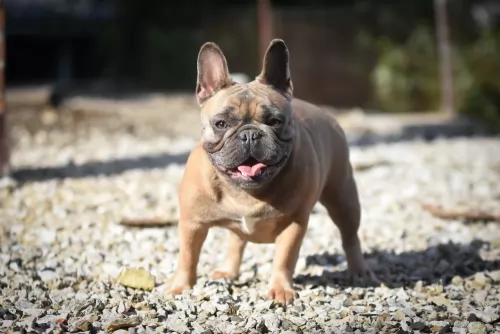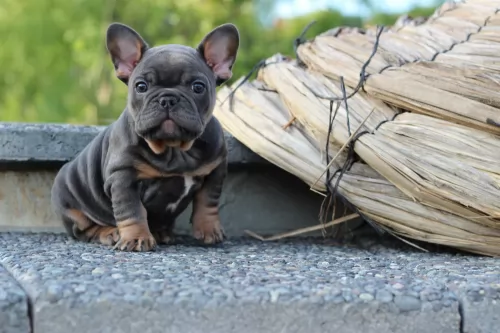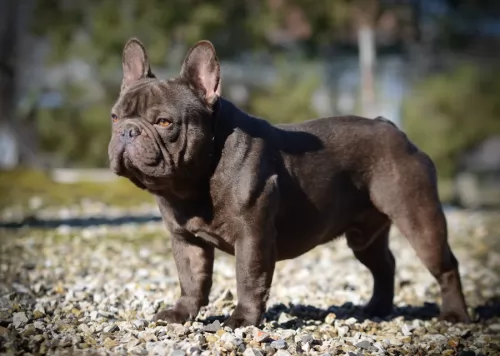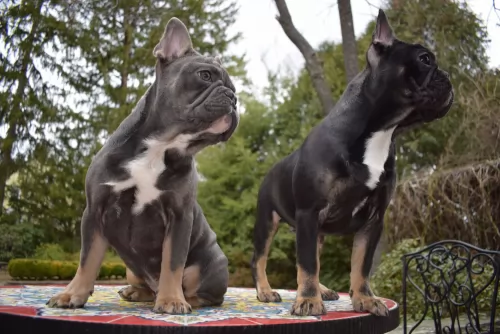 Petzlover
Petzlover French Bulldog is originated from France but Saarlooswolfhond is originated from Netherlands. French Bulldog may grow 40 cm / 15 inches shorter than Saarlooswolfhond. French Bulldog may weigh 31 kg / 68 pounds lesser than Saarlooswolfhond. Both French Bulldog and Saarlooswolfhond has same life span. Both French Bulldog and Saarlooswolfhond has almost same litter size. Both French Bulldog and Saarlooswolfhond requires Low Maintenance.
French Bulldog is originated from France but Saarlooswolfhond is originated from Netherlands. French Bulldog may grow 40 cm / 15 inches shorter than Saarlooswolfhond. French Bulldog may weigh 31 kg / 68 pounds lesser than Saarlooswolfhond. Both French Bulldog and Saarlooswolfhond has same life span. Both French Bulldog and Saarlooswolfhond has almost same litter size. Both French Bulldog and Saarlooswolfhond requires Low Maintenance.
 The french bulldog originated in England and are bred expecting small size bulldogs. Many lace workers in Nottingham had little bulldogs and when they emigrated to france, they brought their dogs with them. Soon they become popular in France and Europe. Then Americans showed interest in them.In 1896 frenchie was shown in United states in a show and after that they got their nickname "Frechie".
The french bulldog originated in England and are bred expecting small size bulldogs. Many lace workers in Nottingham had little bulldogs and when they emigrated to france, they brought their dogs with them. Soon they become popular in France and Europe. Then Americans showed interest in them.In 1896 frenchie was shown in United states in a show and after that they got their nickname "Frechie".
 Dutch breeder Leendert Saarloos began to breed German Shepherds to a European wolf. His goal was to bring out a dog that was more hard working.
Dutch breeder Leendert Saarloos began to breed German Shepherds to a European wolf. His goal was to bring out a dog that was more hard working.
The Dutch Kennel Club recognized this dog breed in 1975, and to give honor to the breeder, they gave the name to the dog - Saarloos Wolfdog. The dog was also recognized by the Federation Cynologique Internationale.
Today the Saarloos is regarded as a pet and companion. It was in 2015 that a study found that this dog showed more genetic association with the gray wolf.
 Frenchie is a good companion dog and has a powerful muscular body. They like to play but also likes to relax for more time. They are intelligent and training them is very easy until they think it a game. They are free thinkers and are not very good in obedience. Frenchies should not be leaved alone for a long time.They love spending time with humans and generally they get along with everyone. They are excellent watchdogs and alerts when strangers come.
Frenchie is a good companion dog and has a powerful muscular body. They like to play but also likes to relax for more time. They are intelligent and training them is very easy until they think it a game. They are free thinkers and are not very good in obedience. Frenchies should not be leaved alone for a long time.They love spending time with humans and generally they get along with everyone. They are excellent watchdogs and alerts when strangers come.
French bulldog suits very well in apartments. But they should be made to walk for fifteen minutes daily to avoid over weight. They should not be kept outside on hot days. Frenchies will be very happy if you stay in home. They will follow you wherever you walk inside the house. They love people so much, such that people who own a Frenchie can not imagine life without them.
 The Saarloos Wolfdog is a large dog standing at between 60–75cm male and female and weighing between 30 and 45kg. He is athletic and muscular with a short, dense coat. Colors are wolf-grey, white and red. The Saarloos has wolf-like expressions so the ears are erect, the muzzle pointed and the tail long and plumed. They eyes are a yellow color. The face is bright and alert, showing how intelligent he is.
The Saarloos Wolfdog is a large dog standing at between 60–75cm male and female and weighing between 30 and 45kg. He is athletic and muscular with a short, dense coat. Colors are wolf-grey, white and red. The Saarloos has wolf-like expressions so the ears are erect, the muzzle pointed and the tail long and plumed. They eyes are a yellow color. The face is bright and alert, showing how intelligent he is.
The Saarloos Wolfhound is full of energy so will be looking toward his owner to come up with good exercise for him.
A walk will always be welcome, but for such a lively dog, he’ll want something more energetic such as a hike, swimming, being allowed to run off his leash in the park and lots of vigorous ball- and rope games.
He is an independent dog and for this reason you’ll want him trained and socialized to make him obedient. He is loyal and loving but some of his wolf-like characteristics might mean that he isn’t a good choice for the first-time dog owner. If the first time dog owner is firm, consistent, strong and kind, then everything will be alright.
 They are good children friendly dogs as they like to play with them. It will be good if they are supervised by an adult.
They are good children friendly dogs as they like to play with them. It will be good if they are supervised by an adult.
They are polite with everyone including other pets. They love to play games and chase balls but don't need much exercise.
Frenchies adapts well for apartment living but they don't like being alone for long time. They will not tolerate both hot and cold weather and so air conditioning will be better.
French Bulldogs are easy to train and are very much interested in playing.
 The Saarloos Wolfhound is a beautiful wolf-like dog that is full of life and energy. When you bring him into your life, you’re going to to have a wonderful addition to your family.
The Saarloos Wolfhound is a beautiful wolf-like dog that is full of life and energy. When you bring him into your life, you’re going to to have a wonderful addition to your family.
He is an independent dog that is strong-willed so it pays to have him trained and socialized, and then he becomes a balanced, well mannered dog that is loving and loyal with his beloved human family.
 Frenchies can suffer from Von Willebrand's disease(VWD)and thyroid condition. Due to their flat faces they suffer from elongated soft palate or cleft palate. Because of their compacted air way they have inability to effectively regulate temperature.
Frenchies can suffer from Von Willebrand's disease(VWD)and thyroid condition. Due to their flat faces they suffer from elongated soft palate or cleft palate. Because of their compacted air way they have inability to effectively regulate temperature.
Any indication that the hair is unhealthy, such as brittleness and hair loss, should be addressed immediately to avoid any further damage. Hair loss becomes a problem when it becomes excessive, possibly due to disease or a particular condition.
 A well bred Saarloos Wolfhound is regarded as very healthy, and with good care they can reach up to 12, 13, 14 or 15 years of age.
A well bred Saarloos Wolfhound is regarded as very healthy, and with good care they can reach up to 12, 13, 14 or 15 years of age.
This is a common canine disease which comes about when a dog’s hip joints don’t develop properly. For a dog diagnosed with hip dyslasia it can be painful lying down and getting around.
Hip dysplasia is a genetic condition, but diet also plays a part as well as environmental factors. All dogs breeds are susceptible to hip dysplasia. Try and avoid your dog putting on too much weight as then it puts excessive strain on the joints. There are different treatment options to make it more comfortable for your pet.
 As with all dogs, proper nutrition makes your French Bulldog a happy, healthy pup. He should have his own food and water bowls. Don't feed your French bulldog puppy, uncooked meat or food that may have gone bad. Young puppies need relatively large amount of food in order to meat the demands of their rapidly growing bodies and their hectic lifestyle. Feed your puppy specially designed chewing treats from reputable pet stores.
As with all dogs, proper nutrition makes your French Bulldog a happy, healthy pup. He should have his own food and water bowls. Don't feed your French bulldog puppy, uncooked meat or food that may have gone bad. Young puppies need relatively large amount of food in order to meat the demands of their rapidly growing bodies and their hectic lifestyle. Feed your puppy specially designed chewing treats from reputable pet stores.
According to the French BullDog Club of America, there are no specific guidelines for feeding them. Options for feeding your French Bulldog are commercial dry food, canned food, raw food and homemade meals. Calories required for frenchie varies depending on size, age, activity level and metabolism.
Frenchies can be made to walk or run for a particular distances. Heavy exercises should not be given as they face respiratory problems. Avoid exercising them in hot weather as they have chances of getting heatstroke.
 He’s an active dog so he will need a good dose of exercise to keep that muscular, lean look.
He’s an active dog so he will need a good dose of exercise to keep that muscular, lean look.
You will need to brush the dense double coat twice a week to ensure the removal of loose hairs and to keep the coat shiny and glossy. Trim his nails and check inside his mouth as he can’t tell you when he has a rotten tooth which can cause a lot of pain.
Feed puppies 4x a day.
Puppies 6 months on can have 2 meals a day.
Always feed your dog premium-quality dry food. Twice a week you can add home-made food to the dry kibble as a tasty treat. Add boiled chicken, brown rice or pasta and spinach, sweet potatoes and carrots. This food can all be chopped up and a portion added to the kibble. The rest can be frozen and then a portion warmed up for another meal.
Try and add some raw meat to his food occasionally as this helps to keep skin problems at bay.
Ensure there is always a bowl of fresh, cool water within his reach.
Your pet needs a warm, dry, comfortable place to sleep to call his own.
If your dog spends a lot of time outdoors, make sure there is both shade and sun.
Spaying and Neutering – beneficial if you don’t want puppies.
Vaccinations for puppies and adults to stave off deadly canine diseases.